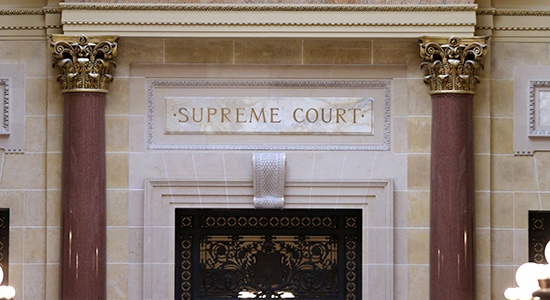
Jan. 11, 2017 – The Wisconsin Supreme Court recently ruled that a criminal defendant waived his statutory right to be present at his own trial by engaging in manipulative and disruptive behavior, even though he did not expressly waive his right on record.
After Michael Washington was charged with burglary and obstructing an officer, two appointed attorneys attempted to represent him but found that difficult and withdrew. A third appointed attorney attempted to withdraw but the judge denied the motion.
Counsel submitted two more withdrawal motions but again, the judge denied the motion, concluding Washington was trying to manipulate the system through purposeful disagreement tactics with his appointed attorneys, which could continue indefinitely.
On the day of trial, Washington was back at it. He refused representation by his lawyer. The judge exchanged words with Washington, explaining that the trial would move forward without him if necessary, and Washington said: “I’m gone. She’s not representing me.” Thus, the judge had Washington removed from the courtroom.
The judge determined that the trial would proceed without him because Washington waived his right to be present. A jury was selected and the trial commenced the next day. Washington was offered an opportunity to participate five times, but declined.
The jury convicted Washington. Three months later, Washington was present when the judge sentenced him to five years in prison, with five years extended supervision. Washington filed a postconviction motion, arguing his statutory rights were violated.
Under Wis. Stat. section 971.04(1), defendants have a right to be present at trial and various pre- and post-trial proceedings, such as jury selection and sentencing.
Section 971.04(3) says a trial can proceed without the defendant if the defendant voluntarily absents himself or herself and was present “at the beginning of the trial.”
Washington argued that he was not “present at the beginning of the trial” – when the jury was sworn in – so his statutory right to be present at trial was violated when a trial was held in his absence.
The circuit court denied his postconviction motion, and an appeals court affirmed. Recently, in State v. Washington, 2017 WI 8 (Jan. 9, 2017), the state supreme court unanimously affirmed, with a concurrence filed, concluding Washington waived his right.
The majority said section 971.04(3) did not apply to Washington because of his refusal. “The statute was aimed at a defendant the court cannot locate,” wrote Justice Ann Walsh Bradley, to discourage them from halting commenced trials by ditching out.
“It is not aimed at a defendant who is easily located in the jail but steadfastly refuses to participate in any proceedings,” she wrote.
The majority distinguished a case in which the defendant did not return from a recess during voir dire and one in which the defendant did not show for sentencing. In both cases, the court ruled the defendant could not be convicted or sentenced in absentia.
“[B]oth of these cases present situations where the defendant did not make, on the record, an affirmative intentional relinquishment of the right to be present,” wrote A.W. Bradley, noting Washington’s case was different.
That is, Washington conveyed personal, on-the-record comments that he did not wish to be present, even though he did not expressly waive the right to be present. And he waived the right through conduct after refusing to be present despite numerous offers.
“Although we do not find Washington’s arguments persuasive, we once again emphasize that the best practice is to engage the defendant in a colloquy,” Justice A.W. Bradley wrote. “A formal colloquy is by far the best practice to ensure that a defendant is knowingly, intelligently, and voluntarily waiving a right.”
Concurrence
Justice Michael Gableman, joined by Justices Rebecca Bradley and Daniel Kelly, agreed that Washington waived his right to be present at trial through conduct.
“However, I would go further and hold that Washington forfeited his right to be present at trial,” wrote Justice Gableman, urging the court to overrule a 1995 appeals court case that held the “the beginning of trial” commences when the jury has been sworn in.
He said the phrase “at the beginning of trial,” in section 971.04(3), should follow a federal counterpart: it should mean “the day jury selection begins.” Washington was present in court the day the jury was selected before he was removed to the jail.
Gableman said this “presents the most logical balance between honoring the rights of those charged with criminal conduct while at the same time acting as prudent stewards of the public fisc,” noting out-of-custody defendants can abscond if they don’t like the jury pool and still raise a “right to be present” argument if trial commences without them.
